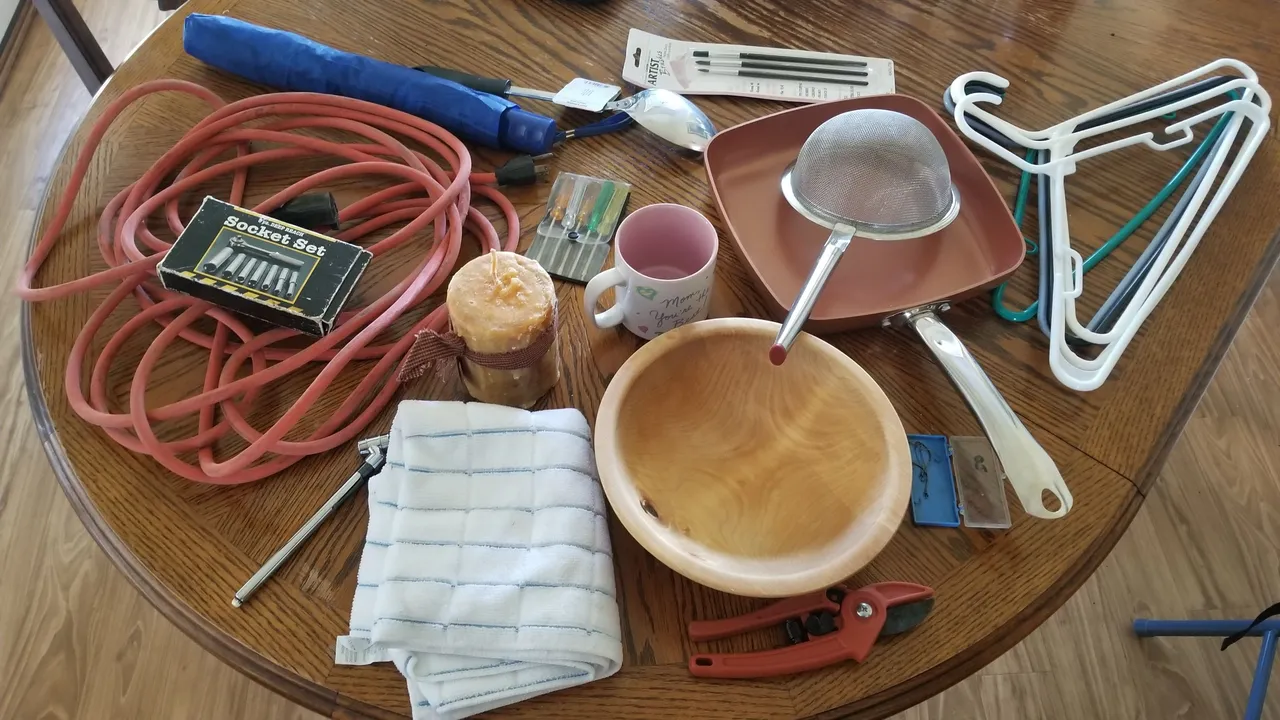We Americans are abundant with stuff.
This abundance branches out to the most specialized categories for a single item:
blanket: quilt, bedspread, duvet, comforter
glove: mitten, muff, chopper, gauntlet
cup: glass, stein, chalice, goblet, flute
Such specificity and precision can benefit the experience with the item. (Champagne is just better from a flute.) We also find joy in discovering and obtaining items (a little treasure hunt)--sometimes for the pleasure of simply having them (the fulfillment of collecting).
We like to be presented with items we might be able to have (a table spread at a garage sale, a store's clearance rack) just to entertain the possibilities. "Well, I wasn't looking for new salt and pepper shakers, but those would be cool to have." And if not for us, then maybe for someone we know.
This brainstorming of possibilities is kicked into high gear when the impending possibility for the item is its disposal. After all, we don't want it to go to waste! It's a perfectly good coffee mug.
This was precisely my thought over the weekend.
My siblings, parents, an aunt and uncle, and I moved Grandma out of her decades-old home. Getting the place ready to sell, we had to decide what to do with items such as:
dinner plates, Christmas lights, books, silverware, vases, pots and pans, yarn, folding chairs, suitcases, lamps, wrenches and tools, fishing pole and tackle, and many other things--such as coffee mugs
Looking at one particular mug, adorned in a detailed wildlife scene featuring a duck in flight, I was struck by the contrast comparing our lifestyle in America to that of the villagers in Tanzania where I volunteered in 2014.
I said to my uncle nearby, "This mug is in perfect shape and would be a prize possession to one of those villagers. And here we are about to trash it."
Adding to the sense of loss from throwing away something in good shape is some potential guilt for dismissing that which would be cherished elsewhere.
My brother once remarked on this on a warm, summer day last year as we unfolded a couple of chairs in front of his grill--two of many chairs he had in his garage.
In a tone resembling "what's wrong with us?", he said to me, "We just have so much stuff."
"You work 60 hours a week," I replied in defense of his abundance of chairs.
America is a culture of long work hours and much production, a society where people often have to run to keep up, to support a family one doesn't get to see as much as he/she would like.
"They don't have this coffee mug in that Tanzanian village. They also don't have the rates of mental disorders and addiction," I continued with my uncle back in Grandma's garage.
I'll never forget how refreshingly joyful and happy the people in that village were.
We Americans pay a price for our abundance. Best we enjoy it.
The trick is to be mindful of our connection to things, so that it doesn't interfere with the free flow of our lives. Why buy items on clearance I'd never have bought otherwise? Why hold onto items I don't use? I've moved several times and have books I haven't read, clothes I haven't worn, and items I haven't used included in each of those moves. Such burdens.
Marie Kondo got famous a few years back spreading a message of simplicity centered around questions such as: "Does this object help me live the life I want most?" and "Does this item spark joy?"
I realized over the weekend the truth that it can be more wasteful to weigh oneself down with unnecessary items than it is to throw them in the trash. That said, I did come away from Grandma's move-out with several items of my own:

Some I'll use (towel). Some I'll probably intend to but won't (paint brushes).
Our society is so good at production and consumerism. If approached right, we can moderate this trait to benefit our lives--and others' lives through charity, who in America are often beset by the unfortunate irony that while America's "abundance" lifestyle provides for those less fortunate, it also demands individual performance many are challenged to undertake.
